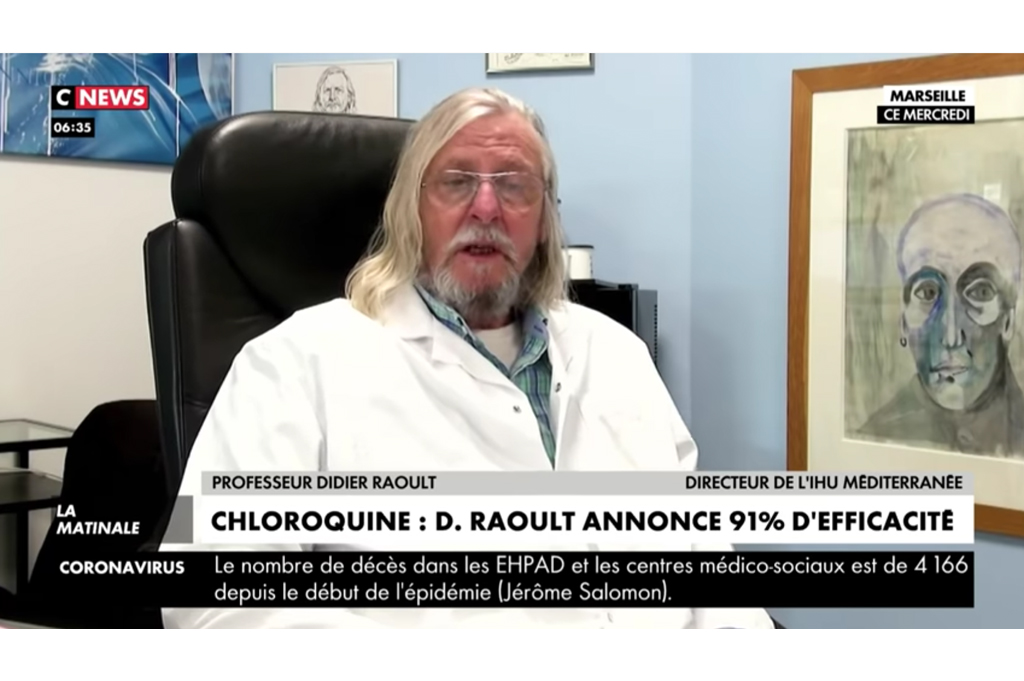Professors of medicine do not usually look as if they have emerged from the pages of Asterix, or alternatively as if they were the drummer of a 1960s rock band just emerged from drug rehabilitation for the 17th time: but that is how Prof Didier Raoult, recently elevated to the rank of the most famous infectious disease doctor in the world, looks. If you type ‘Didier’ in your search engine, up comes Raoult, before even the soccer player, ‘Drogba’. When infectious disease doctors are more famous than footballers, you know that an epidemic is serious.
Raoult says that he adopted his appearance to irritate his colleagues, which is another specialization of his, one at which he is undoubtedly very good. And it was he who, in advance of any proof that most doctors would consider of any true scientific value, persuaded President Trump, and half the world, that hydroxychloroquine, in combination with azithromycin, was a cure for COVID-19 infections. President Macron recently paid him an unscheduled visit in his hospital in Marseille. Has he, then, become a convert, as believers in Raoult treatment regime are now known?
Actually, Raoult was an extremely eminent man even before he shot to media fame as a medical guru. Unlike most gurus, his superior wisdom is not to be deduced from his eccentric appearance alone, for his scientific achievements are solid and indisputable. He is never shy of enumerating them, it is true, but his boasting is so transparent that it transcends mere egotism to become a species of naivety.
He has published, or attached his name to, more than 3,000 scientific articles, and he has published widely in most famous medical journals in the world such as the Lancet and the New England Journal of Medicine. A genus of microorganisms has been name after him, its discoverer, and readers of his latest book, Épidémies: Vrais dangers et fausses alertes (which must have been written at top speed because it contains references to medical literature published in the month of its own publication), will be impressed by the scope of interests and achievements, even if they are self-proclaimed. For example, it was he, with students under his direction, who proved by means of a new technique that skeletons found in Marseille died of the plague of 1720 (the last in Europe). He also proved that the Black Death of 1348 really was caused by the plague, contrary to recent speculations that it was caused by a hemorrhagic fever.
Prof Raoult, who has a jaundiced view of mathematical modeling of epidemics because they have so often in the past been so wildly, and in retrospect ridiculously, wrong and exaggerated, has consistently pleaded during the current epidemic for a sense of proportion about it. At least in terms of mortality, if not in those of the clinical horrors it produces, it is by no means unusual (he says): there have been many worse epidemics. It undoubtedly takes a certain bravery to say this publicly now, when no one yet knows where or how the epidemic will end.
His view from the beginning has been that the whole approach to the disease in France and other countries has been wrong. There should have been mass testing and treatment of the infected with his drug regime. If that had been done from the start, we should not have been facing the economic and social apocalypse that is now staring us in the face. What he says, if true, is of world-historical importance.
But is it true? While he claims excellent results for his treatment, with a much reduced death rate from the infection, most of his peers (not that he recognizes any as such) do not believe that he has established his case for it. His publications on the subject are very poor methodologically, and in this context method is all. For example, in one of his publications, widely and justly criticized, he broke practically all the rules of proper clinical trials. It was tiny, the subjects and controls were not allocated randomly, it excluded patients who ended badly from its analysis of the results of treatment, it gave completely insufficient clinical details of the subjects of the trial, it did not keep to the trial’s protocol, and so forth. Prof Faillie of Montpellier, Dr Olivier and Professor Sommet of Toulouse could hardly have been more damning: ‘To conduct a bad study [such as his] amounts to an ethical fault,’ they wrote. Even if he turns out to have been right, he will, by his unjustified dogmatism, have done harm to the enterprise of proper medical research.
***
Subscribe for three months’ free access to The Spectator USA —
then just $3.99/month
***
Raoult would reply that his opponents and detractors are conventional, plodding, stick-in-the-mud apparatchik types. He is good at ad hominem attacks, and no doubt sometimes hits the mark. He detests the Parisian domination of everything, having pursued his whole career in Marseille, but the fact that his provincial colleagues do not agree with him somewhat undermines the simple story of the Parisian Goliath versus the provincial David. Moreover, those who criticize him do not rule out a priori that he is right, and indeed have expressed the hope that he is right: they merely say that he has not proved his case, which is all the more important to do because hydroxychloroquine is not an otherwise innocuous substance that can do no harm: it can kill patients. Indeed, a proper scientific trial of hydroxychloroquine has been started and its results will soon be known.
In an interview with Le Figaro, Raoult said that he did not intend to wait for the results of the trial. As a doctor, he said, he was ethically obliged to do the best for his patients according to the best of his ability and knowledge, and he was convinced that his drug treatment worked. Therefore, he would continue to use it whatever the trial found. He pointed out — truthfully but in my opinion irrelevantly — that many useful or life-saving treatments had been adopted without double-blind trials that would meet modern methodological criteria. Raoult’s argument, in essence, is at the same intellectual level as that of the song, ‘Fifty Million Frenchman Can’t Be Wrong’. What is curious is that so brilliant and accomplished a man does not see it.
There is no doubt, however, that Prof Raoult has convinced huge numbers of people, not only in France. If he is proved right, his view of the world — that it is full of mediocrities opposing strokes of genius — will become widely accepted. If he is proved wrong, at least in the sense that the scientific trials do not support his contentions, I predict that he will still have a following. When you see pictures of people lining up on the steps of his hospital to be first tested and then treated by his method if positive for the virus, I cannot help but think that the professor has, inadvertently or not, become a religious leader, the founder of a cult. His treatment method will therefore survive any demonstration that it doesn’t work. When prophecies fail, they are not abandoned, they are simply projected once more into the future. And, after all, if I were seriously ill and likely to die I would probably want to try his regime, faute de mieux.
Theodore Dalrymple’s latest book is
In Praise of Folly (Gibson Square).

























